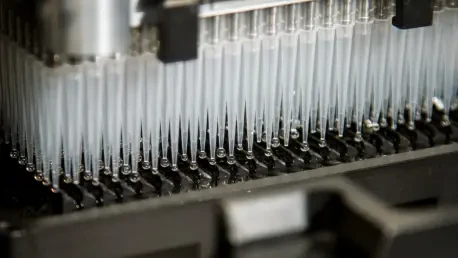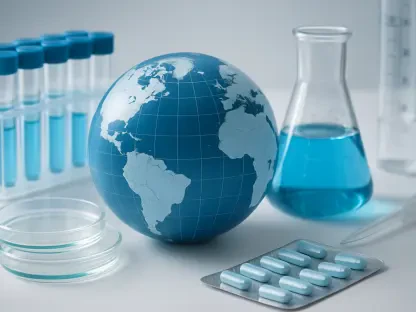The biopharmaceutical industry is undergoing a transformative shift as artificial intelligence (AI) and automation technologies are progressively integrated into manufacturing processes. These advancements are addressing critical issues related to production workflows, efficiency, scalability, and regulatory compliance. The growing demand for biologics and personalized medicine necessitates innovative solutions, and AI and automation are providing the means to meet these challenges head-on. By optimizing various aspects of manufacturing, these technologies are not only enhancing production processes but also significantly impacting the global scientific community.
Enhancing Production Efficiency
Optimizing Workflows
AI-driven predictive analytics and machine learning models have become invaluable in identifying bottlenecks within production workflows. Traditionally, biopharmaceutical manufacturing processes have been labor-intensive, often prone to variability, leading to inefficiencies and heightened operational costs. The integration of AI in these processes allows for the precise identification of inefficiencies, enabling the effective allocation of resources. These optimizations considerably reduce variability, increase overall efficiency, and lower operational costs. By leveraging AI’s capabilities, manufacturers can forecast potential issues and streamline workflow processes, minimizing disruptions and creating more robust and reliable production systems.
Moreover, these AI-driven solutions provide real-time insights into production parameters, allowing for quick adjustments to maintain optimal conditions. This level of dynamic control not only improves productivity but also enhances the consistency and quality of the final product. As the industry continues to adopt these technologies, the benefits of optimized workflows will become even more pronounced, ensuring manufacturers can meet the increasing demands for biologics and personalized medicine with enhanced operational efficiency.
Continuous Manufacturing Systems
The shift from traditional batch processing to continuous manufacturing systems marks a significant milestone in biopharmaceutical production. Continuous manufacturing enables the real-time adjustment of process parameters, ensuring uninterrupted output and higher productivity. Automated bioreactors play a crucial role in this transition, facilitating the constant monitoring and optimization of production conditions. These systems are designed to make adjustments on-the-go, responding to changing variables and maintaining seamless operations. This real-time approach minimizes downtime and significantly reduces the likelihood of disruptions, thereby improving scalability and production speed.
AI algorithms further enhance the efficacy of continuous manufacturing by predicting and controlling various process parameters. This predictive capability ensures the processes are conducted under optimal conditions, improving yields and minimizing waste. The ability to fine-tune production processes dynamically through AI intervention guarantees that the final product meets stringent quality standards. Continuous manufacturing systems, empowered by AI, represent a paradigm shift in the biopharmaceutical industry, offering a more efficient and scalable solution than traditional batch processing. The integration of these technologies promises a future where biopharmaceutical production is more consistent, reliable, and aligned with the growing demands of modern medicine.
Improving Quality Control and Product Consistency
Real-Time Data Analytics
Ensuring consistent product quality is paramount in biopharmaceutical manufacturing, given that minor variations can significantly impact drug efficacy and patient safety. AI-powered quality control systems utilize real-time data analytics to meticulously monitor production processes. These intelligent systems analyze extensive data collected from various sensors, laboratory tests, and manufacturing equipment, enabling the early detection of potential anomalies. By identifying defects promptly, these systems prevent minor issues from escalating into critical problems, ensuring consistent product quality.
The implementation of AI in quality control transforms the way data is handled, providing deeper insights and more accurate assessments. These systems can process large volumes of data in real-time, flagging deviations from ideal conditions and taking corrective actions. The continuous monitoring by AI-driven solutions thus ensures that the product adheres to rigorous quality standards throughout the manufacturing process. This proactive approach significantly reduces the risk of non-compliance and enhances patient safety, reinforcing the reliability and efficacy of biopharmaceutical products.
Automated Assessment Techniques
Automation is playing a revolutionary role in quality assessment within biopharmaceutical manufacturing. AI-driven image analysis and machine learning algorithms provide unprecedented accuracy and efficiency in detecting quality deviations. For example, AI-powered microscopy can quickly analyze cell cultures to identify contamination or deviations in growth patterns. This automation of cellular analysis reduces the time and manpower required to conduct thorough quality checks, significantly enhancing the assessment process’s efficiency.
Advanced techniques like high-throughput sequencing also benefit from automation, ensuring precise detection of impurities, which is crucial for regulatory compliance and patient safety. Detecting residual host cell DNA, such as Chinese Hamster Ovary (CHO) cell DNA, is essential for meeting stringent regulatory guidelines. AI-driven algorithms enable the accurate identification and quantification of these impurities, ensuring that biopharmaceutical products meet all safety and quality standards. Automation in these analytical processes not only improves consistency and accuracy but also accelerates the speed at which assessments can be conducted, making it easier for manufacturers to maintain high production standards and comply with regulatory requirements.
Reducing Human Error and Enhancing Safety
Minimizing Manual Interventions
Human error has long been a significant concern in pharmaceutical production, often causing deviations and inconsistencies that can compromise product quality. The advent of automation reduces the necessity for manual interventions, thereby substantially mitigating the risk of errors. AI-powered robotic systems are adept at performing complex tasks such as pipetting, sample handling, and formulation with exceptional precision and reproducibility. These automated systems ensure that each process is executed with exact measurements and consistent techniques, significantly lowering the likelihood of contamination, incorrect measurements, and procedural mistakes.
By decreasing the reliance on human intervention for routine tasks, automation allows skilled professionals to concentrate on more strategic and innovative aspects of biopharmaceutical production. This shift not only enhances overall productivity but also reinforces the safety and reliability of production processes. The meticulous execution of tasks by robotic systems ensures that high-quality standards are maintained consistently, providing greater assurance in the final product’s efficacy and safety.
Predictive Maintenance
AI-driven predictive maintenance plays a crucial role in enhancing the safety and reliability of biopharmaceutical manufacturing environments. These systems continuously monitor the health of manufacturing equipment, analyzing data to predict potential failures before they occur. This proactive approach to maintenance minimizes downtime and prevents costly repairs by addressing issues before they escalate. Predictive maintenance ensures that equipment operates under optimal conditions, safeguarding the continuity and safety of manufacturing processes.
Continuous monitoring and timely intervention by AI systems reduce the likelihood of unexpected breakdowns, maintaining a smooth and efficient production flow. This preventive strategy not only reduces operational disruptions but also enhances the overall safety of the manufacturing environment. By anticipating and addressing maintenance needs proactively, AI-driven systems contribute to the sustained efficiency and reliability of biopharmaceutical production facilities, ensuring that high-quality standards are consistently met.
Accelerating Drug Development and Regulatory Compliance
Optimizing Bioprocess Design
The integration of AI in drug development processes is significantly accelerating the optimization of bioprocess design, leading to quicker and more effective drug formulation and production. Machine learning algorithms analyze extensive datasets derived from clinical trials, historical production records, and genetic studies to identify optimal conditions for biopharmaceutical processes. These insights enable researchers to refine their methodologies, enhancing the efficiency of drug development while simultaneously shortening timelines.
By leveraging AI’s analytical capabilities, manufacturers can make data-driven decisions that align with the best practices and regulatory standards. This optimization not only speeds up the drug development cycle but also increases the likelihood of regulatory approval. The ability to integrate vast amounts of data and extract actionable insights plays a critical role in advancing biopharmaceutical innovation, driving progress in developing new therapies and treatments.
Streamlining Regulatory Reporting
AI and automation are transforming regulatory compliance through streamlined documentation and reporting systems. Automated documentation ensures accurate and consistent record-keeping, mitigating risks associated with compliance violations. AI-driven data analysis enhances regulatory reporting by identifying trends and patterns that meet compliance requirements. These intelligent systems organize and analyze data efficiently, facilitating smoother audits and inspections.
The automated systems reduce the administrative burden on manufacturers, allowing them to focus on refining their production processes and maintaining high-quality standards. Furthermore, AI-enhanced reporting tools ensure transparency and accuracy, providing regulators with the necessary information to assess compliance effectively. This streamlined approach to regulatory reporting is invaluable in maintaining adherence to stringent biopharmaceutical industry standards, ensuring that products are safe and efficacious for patient use.
Integrating Robotics into Biopharmaceutical Workflows
Advanced Robotic Systems
Advanced robotic systems are becoming integral components of modern biopharmaceutical manufacturing facilities. These systems handle various tasks, including vial filling, packaging, and conducting lab-scale experiments, with minimal human intervention. Operating in sterile environments, these robots substantially reduce the risk of contamination, maintaining high production quality standards. The precision and efficiency offered by robotic systems ensure consistent execution of processes, enhancing the reliability of manufacturing workflows.
The use of robotics in biopharmaceutical manufacturing not only improves productivity but also ensures that operations are conducted in compliance with stringent sterile conditions. These automated systems are designed to perform repetitive tasks with uniform accuracy, significantly improving the consistency of the final product. The ability of robotic systems to work continuously without fatigue further elevates the operational efficiency, enabling round-the-clock production while adhering to critical quality control measures.
Collaborative Robots (Cobots)
Collaborative robots, or cobots, are increasingly being integrated into biopharmaceutical workflows to work alongside human operators. These AI-driven machines perform repetitive or hazardous tasks, allowing skilled professionals to focus on complex problem-solving and innovation. Cobots enhance workforce productivity by taking over mundane tasks, thereby streamlining production processes and improving efficiency.
The interaction between human workers and cobots fosters a collaborative environment where technological advancements complement human expertise. Cobots are designed to be user-friendly and adaptable, making it easier for operators to manage and oversee their tasks. This synergy between humans and robots not only enhances operational efficiency but also drives innovative solutions within the biopharmaceutical industry. By integrating cobots into manufacturing workflows, companies can develop a more resilient and agile production environment that adapts to the evolving demands of biopharmaceutical manufacturing.
Embracing AI and Automation for the Future of Biopharmaceutical Manufacturing
The biopharmaceutical industry is experiencing a significant transformation as artificial intelligence (AI) and automation technologies are increasingly integrated into manufacturing processes. These advancements address critical issues concerning production workflows, efficiency, scalability, and regulatory compliance. The rising demand for biologics and personalized medicine calls for innovative solutions, and AI and automation are providing the necessary tools to tackle these challenges. By optimizing various aspects of manufacturing, these technologies enhance production processes, improve quality control, and reduce human error, thereby positively influencing the global scientific community. Additionally, AI-driven data analytics offer insights into process optimization and predictive maintenance. Automation streamlines repetitive tasks, allowing human expertise to focus on more complex problems. As the biopharmaceutical industry continues to embrace AI and automation, the sector is positioned for increased efficiency and groundbreaking developments, ultimately leading to better healthcare outcomes and scientific advancements.









